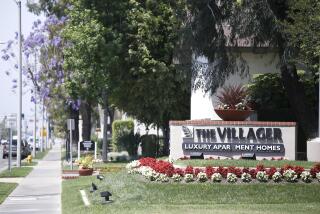New Investment in Lincoln Mortgage Barred : Audit: A state agency alleges $614,000 is missing. The firm denies any wrongdoing.
- Share via
LOS ANGELES — Lincoln Mortgage & Loan Co. in Newport Beach was barred by a state agency Tuesday from taking on new investors.
The Department of Real Estate said it issued a restraining order after an account holding investors’ money came up at least $600,000 short. An investigation is continuing.
The Department of Corporations, which regulates the sale of investments in California, is also investigating.
Lincoln Mortgage, owned by Kenneth E. Sarvak of Newport Beach, lent hundreds of investors’ money to home buyers or people taking out second mortgages.
Many of the investors are older, retired people who put up as little as several thousand dollars to more than $1 million.
More than a dozen of them have sued Lincoln in Orange County Superior Court, most in the past few months. Some contend that their investments were not as safe as the 68-year-old Sarvak had promised.
If the company files for bankruptcy, as it said in September that it might, the investors say they fear they will lose their money.
The company denied any wrongdoing. “It’s Mr. Sarvak’s belief that he has always been in compliance with the law,” said one of his lawyers, John B. Casoria. “Therefore, we don’t see the order as detrimental at this time.”
Tuesday’s restraining order is the result of an audit that Department of Real Estate investigators began earlier this year. The audit, the department said, uncovered a trust account at one of Lincoln’s sister companies that by the end of June contained at least $614,000 less than it should have.
The money was removed “without the proper written consent of the investor-lenders,” according to the department’s restraining order. Investigators are trying to discover where the $614,000 went.
The money belongs to 17 different investors.
“This is just what we’ve found so far,” said Randy Brendia, the Department of Real Estate’s southern regional manager in charge of enforcement. “The amount could be substantially greater.”
Casoria said the company has no idea what the Department of Real Estate is talking about.
“We seriously question where they got their information,” he said. “It’s our understanding the trust account in question has balanced every month the department has been investigating.
“Everything balances, everything is kosher. As far as we knew, when the auditors left everything was OK.”
In the 1980s, investors were attracted by interest rates of as much as 12% that Lincoln was paying in return for using their money to make loans.
But in the past few years, some investors contend in their lawsuits, Sarvak would try to stall them and ask for another year when it was time to repay the principal.
This year, they contend, in some cases he stopped paying interest altogether.
When they asked Sarvak for their money, some investors contend in their lawsuits, he told them much of Lincoln’s capital was tied up in an unsuccessful scheme to develop land for a subdivision called Belle Meadows in Riverside County.
Their complaints brought in the Department of Real Estate, which called in the Department of Corporations after scrutinizing Lincoln’s books.
The trust account, investigators said, held money from Lincoln’s so-called “hard money” second mortgage business. Hard-money lenders generally charge higher interest and fees because their customers often are considered by banks or thrifts to be credit risks. Hard-money lenders typically expect to foreclose on the borrower’s property and sell it when the borrower cannot make the payments.
Investigators found 11 hard-money loans that had been paid off in full between July, 1991, and August, 1992, according to the restraining order; the money should have been kept in the trust account for investors.
Meanwhile, investors contend in lawsuits, Sarvak promised them that their investments would be secured by an interest in the deed to the house on which they were lending money.
If a borrower stopped paying, the investor theoretically could then foreclose, sell the house, and recoup his or her investment.
The lawsuits allege that Sarvak instead kept the deeds--so investors may be out their money. At least one lawsuit alleges that Lincoln Mortgage is insolvent.
The company denies those allegations as well. The complaints are merely the result of faulty bookkeeping, the company said.
Lincoln can demand a hearing to contest the restraining order.
More to Read
Sign up for Essential California
The most important California stories and recommendations in your inbox every morning.
You may occasionally receive promotional content from the Los Angeles Times.













